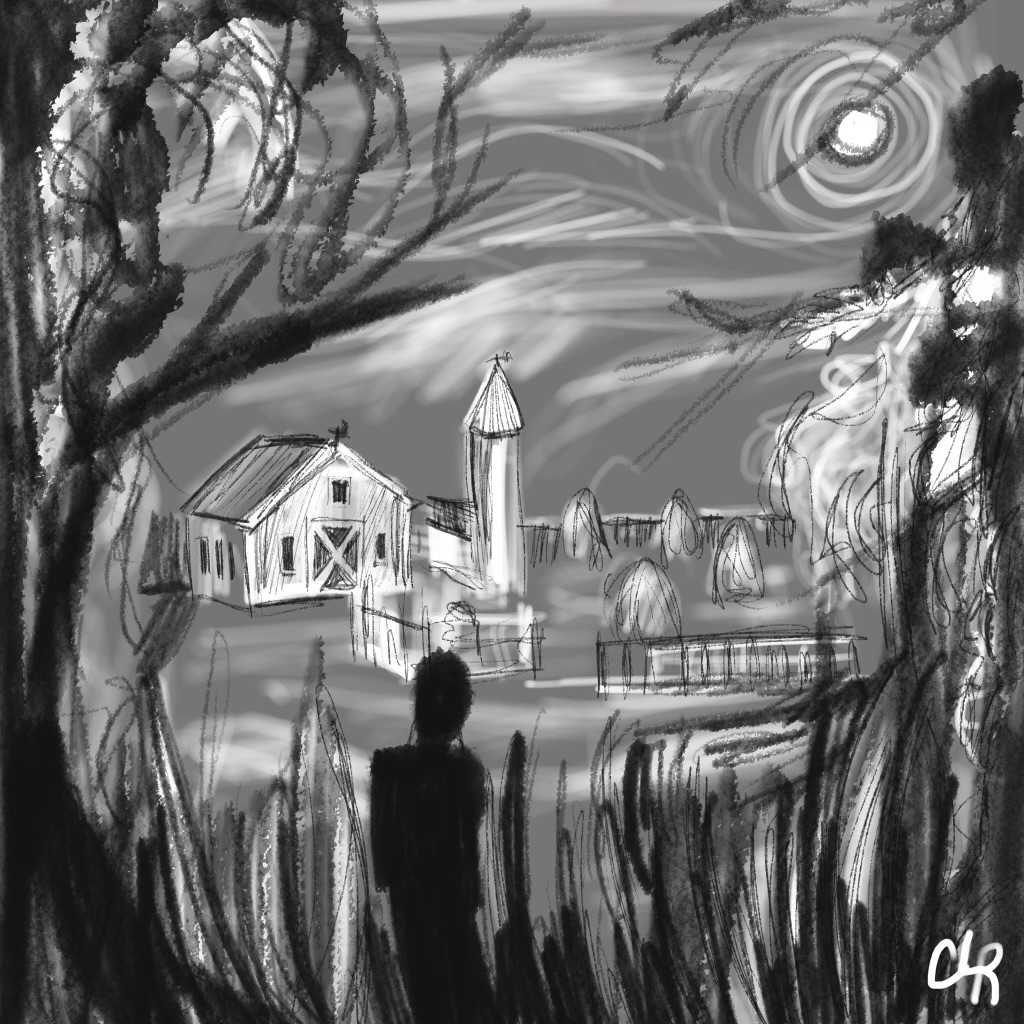Chronos feasts on his children
March 3, 2023
 Lauren Russler
Lauren Russler“The dead surround the living. The living are the core of the dead. In this core are the dimensions of time and space. What surrounds the core is timelessness.” – John Berger
Crouched, drawing circles in the dirt with his finger under the glare of the afternoon sun, the boy waited for his grandfather to return. The old man was running late, as usual. What he used to accomplish in a single day, long before the dew on the hay had dried, turned into two full mornings and early afternoons of scything. The field’s demands hadn’t changed; his body was beginning to spoil.
The boy’s father died a long time ago—at least, it felt like it. It became harder and harder to keep track of the days. Early on, the old man kept a tally, carving one tick into the wall before leaving their cramped hunting lodge every morning. The boy’s father always thought it was useless—what did time matter to the last men on earth? After the boy’s father died, the old man quit tallying. The boy, old enough to feel the pain of his father’s absence but not old enough to understand the change that had come over his grandfather, resumed the tally before they’d missed two sunrises. When he couldn’t fall asleep, the boy would find the marks above his cot and with chilled fingertips count the days since the invisible wall had descended around them. He always dozed off before he finished counting, lulled by the rhythm of his grandfather’s rattling breaths.
After he’d waited long enough, the boy crossed the gorge and walked through the small patch of forest to the place where he knew he’d find the small farm and, hopefully, his grandfather. He’d hardly been back to the farm since his father died, and he hadn’t stepped foot inside the byre at all.
On a hunting trip, the trio were alarmed by what sounded like agonized wailing. They followed the cries to a byre on a small farm, where they found an unmilked cow, distressed but alive, and the remains of another heifer and her half-birthed calf. The conjoined corpses were putrid, riddled with blowflies. Unable to bear the odor, the boy waited outside with his grandfather, who had begun milking the haggard cow while his father hacked the dead into pieces and lugged them out of the byre. The boy was sorry his father didn’t bother burying them, but he couldn’t bring himself to approach the pile of rancid flesh. Waiting for the work to finish, he curled up in a ball and was soon asleep in the grass like a lost kitten. A dull thud and his grandfather’s shouts woke him, and he ran to the source. On the floor of the byre, his father lay mired in the rot and larvae with a hoof-shaped depression in the center of his chest, still clutching his ax.
The forest opened up, and the boy left his memories among the leaf mold, suddenly preoccupied with the search for his grandfather. He entered the farmhouse first. Papers filled with a farmer’s scrawl were spread across the table, the bed was unmade and a worn copy of A la recherche du temps perdu lay opened, face-down on the pillow. If not for the thin layer of dust or the staleness of the pent up air or the silence that descends upon disasters like a bell jar, it might have seemed as though the farmer and his family would return at any moment. The boy picked up the book, closed it and replaced it on the pillow before stealing off to the byre.
There, the old man was slumped over a mound of dried hay. Locking eyes with the old cow, the boy dipped a finger into the bucket of milk below her, still warm. He called to his grandfather, who didn’t reply. The boy, not one to be cruel, did not remark upon the odor emanating from the old man’s body; the shame of decay need not be increased by ridicule, he thought. Holding his breath, the boy shook his grandfather. The old man didn’t stir.
The boy recognized the stillness, and he knew he’d have to cut hay this season, plant the potatoes and beans and return to the byre to milk the cows each day, for the remainder of days. He thought about the tally marks and began to worry, what would he do when all the lodge walls were filled with them, where would he keep count? He would figure it out. Until then, he dragged his grandfather’s body from the byre, larger than his own but somehow lighter, kneeled and began to hollow out the earth with his hands.

Comments
Before submitting a comment, please review our comment policy. Some key points from the policy: